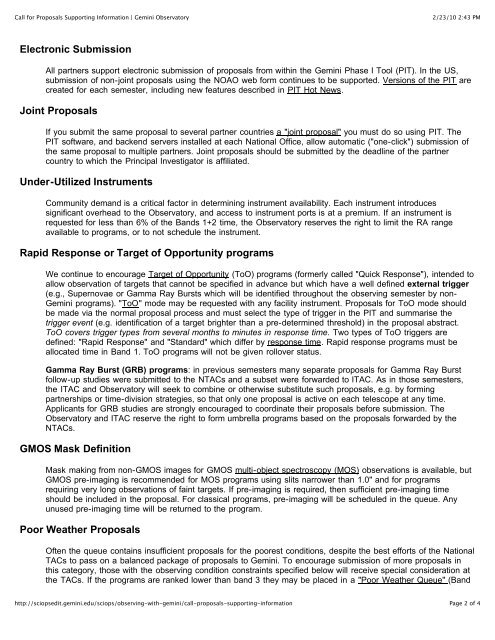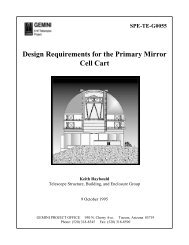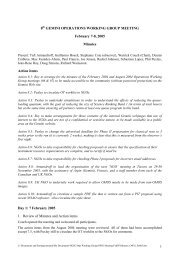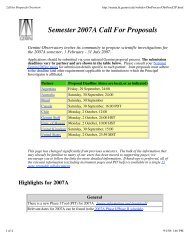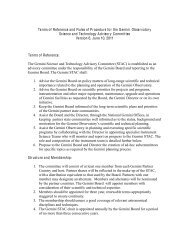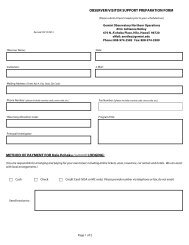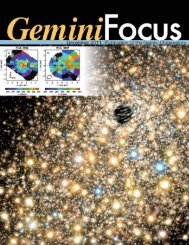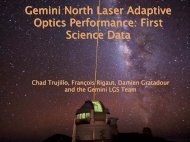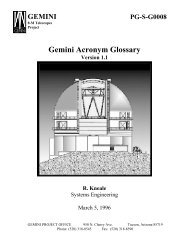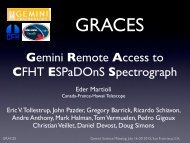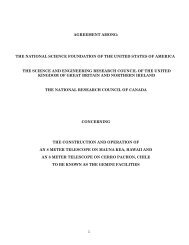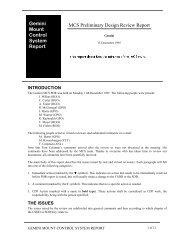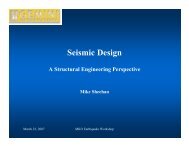pdf document - Gemini Observatory
pdf document - Gemini Observatory
pdf document - Gemini Observatory
You also want an ePaper? Increase the reach of your titles
YUMPU automatically turns print PDFs into web optimized ePapers that Google loves.
Call for Proposals Supporting Information | <strong>Gemini</strong> <strong>Observatory</strong><br />
2/23/10 2:43 PM<br />
Electronic Submission<br />
All partners support electronic submission of proposals from within the <strong>Gemini</strong> Phase I Tool (PIT). In the US,<br />
submission of non-joint proposals using the NOAO web form continues to be supported. Versions of the PIT are<br />
created for each semester, including new features described in PIT Hot News.<br />
Joint Proposals<br />
If you submit the same proposal to several partner countries a "joint proposal" you must do so using PIT. The<br />
PIT software, and backend servers installed at each National Office, allow automatic ("one-click") submission of<br />
the same proposal to multiple partners. Joint proposals should be submitted by the deadline of the partner<br />
country to which the Principal Investigator is affiliated.<br />
Under-Utilized Instruments<br />
Community demand is a critical factor in determining instrument availability. Each instrument introduces<br />
significant overhead to the <strong>Observatory</strong>, and access to instrument ports is at a premium. If an instrument is<br />
requested for less than 6% of the Bands 1+2 time, the <strong>Observatory</strong> reserves the right to limit the RA range<br />
available to programs, or to not schedule the instrument.<br />
Rapid Response or Target of Opportunity programs<br />
We continue to encourage Target of Opportunity (ToO) programs (formerly called "Quick Response"), intended to<br />
allow observation of targets that cannot be specified in advance but which have a well defined external trigger<br />
(e.g., Supernovae or Gamma Ray Bursts which will be identified throughout the observing semester by non-<br />
<strong>Gemini</strong> programs). "ToO" mode may be requested with any facility instrument. Proposals for ToO mode should<br />
be made via the normal proposal process and must select the type of trigger in the PIT and summarise the<br />
trigger event (e.g. identification of a target brighter than a pre-determined threshold) in the proposal abstract.<br />
ToO covers trigger types from several months to minutes in response time. Two types of ToO triggers are<br />
defined: "Rapid Response" and "Standard" which differ by response time. Rapid response programs must be<br />
allocated time in Band 1. ToO programs will not be given rollover status.<br />
Gamma Ray Burst (GRB) programs: in previous semesters many separate proposals for Gamma Ray Burst<br />
follow-up studies were submitted to the NTACs and a subset were forwarded to ITAC. As in those semesters,<br />
the ITAC and <strong>Observatory</strong> will seek to combine or otherwise substitute such proposals, e.g. by forming<br />
partnerships or time-division strategies, so that only one proposal is active on each telescope at any time.<br />
Applicants for GRB studies are strongly encouraged to coordinate their proposals before submission. The<br />
<strong>Observatory</strong> and ITAC reserve the right to form umbrella programs based on the proposals forwarded by the<br />
NTACs.<br />
GMOS Mask Definition<br />
Mask making from non-GMOS images for GMOS multi-object spectroscopy (MOS) observations is available, but<br />
GMOS pre-imaging is recommended for MOS programs using slits narrower than 1.0" and for programs<br />
requiring very long observations of faint targets. If pre-imaging is required, then sufficient pre-imaging time<br />
should be included in the proposal. For classical programs, pre-imaging will be scheduled in the queue. Any<br />
unused pre-imaging time will be returned to the program.<br />
Poor Weather Proposals<br />
Often the queue contains insufficient proposals for the poorest conditions, despite the best efforts of the National<br />
TACs to pass on a balanced package of proposals to <strong>Gemini</strong>. To encourage submission of more proposals in<br />
this category, those with the observing condition constraints specified below will receive special consideration at<br />
the TACs. If the programs are ranked lower than band 3 they may be placed in a "Poor Weather Queue" (Band<br />
http://sciopsedit.gemini.edu/sciops/observing-with-gemini/call-proposals-supporting-information<br />
Page 2 of 4


